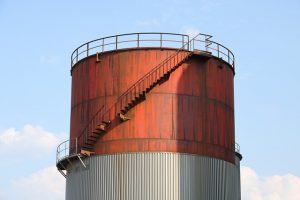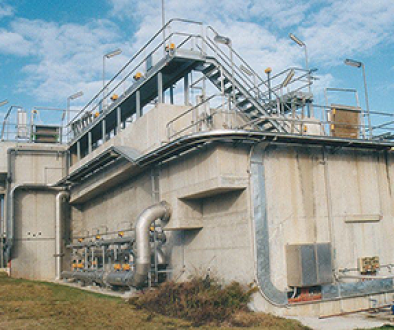Corrosion-Free Water Storage Tanks
![]()
How to get more life out of your water storage tanks!
Corrosion is an inevitable phenomenon when a surface comes in contact with water especially for a longer period of time. Therefore, water storage tanks are majorly susceptible to it as they store and carry water for long durations. Water storage tanks have become an integral part of communities for supply of water. There are usually big tanks that disseminate water to each house in the community that has their water storage capacity. Both the communal and the residential tanks are susceptible to corrosion or rusting. Additionally, there exists a possibility of growing bacteria and other water borne germs if the water is held for a long period of time without being used.
 Water tanks are a vital source of providing clean water to households, therefore, it is important to keep this source clean and free from all germs and bacterias in order to avoid any health issues in people who consume it. Tanks made of steel and other metals are more susceptible to corrosion as compared to those made of glass fiber reinforced plastic (FRP). But FRP based tanks also corrode after a few years of service.
Water tanks are a vital source of providing clean water to households, therefore, it is important to keep this source clean and free from all germs and bacterias in order to avoid any health issues in people who consume it. Tanks made of steel and other metals are more susceptible to corrosion as compared to those made of glass fiber reinforced plastic (FRP). But FRP based tanks also corrode after a few years of service.
Rusting is the most common type of corrosion that takes place in water tanks. Steel tanks are most prone to rusting over time. Rusting occurs when the iron content reacts with oxygen forming iron oxide compounds and iron in drinking water can lead to many issues. High iron content in the human body causes health problems related to stomach and throat. In extreme cases, iron overload also causes dysfunction of the liver, and heart or causes diabetes in some vulnerable persons. Iron rich drinks and beverages are not even pleasant looking and also have a significant metallic taste to them. Rusted water also has a tendency to stain kitchen utensils and clothes when used for cleaning and washing.
Corrosion, undoubtedly, decreases the lifespan of a storage vessel, and therefore, it is recommended to protect your tanks by coating them with anti-corrosion sprays for improved life and efficiency. High quality coatings are necessary for tanks containing liquids in order to ensure protection from all contaminants and bacteria which in turn leads to less maintenance over time. One of such solutions is provided by Rhino Linings for a range of applications such as wastewater treatment plants, sludge bins, reservoirs, sewer pump pits, steel holding tanks etc., in addition to water storage tanks.
Epoxy solutions were widely used for protection against leakage, spillage, and corrosion related issues but recently the industry is improving by adapting coatings as a new way of protection against these commonly occurring phenomena. Epoxies have been replaced by coatings because of better flexibility and extended lifespan provided by coatings. Polyurethane and polyurea coatings by Rhino Linings have become market leaders serving the industry for the past 15 years and delivering best solutions for spillage and corrosion problems in clean as well as wastewater plants.
These coatings are easily sprayed on or casted into water tanks in minimal workaround time. They also dry out in less than 24 hours making the water usable for people. Coatings available at Rhino linings are highly versatile as they can be used on a variety of substrate materials including steels, fiberglass, concrete, wood, etc. Our team consists of highly trained professionals who ensure that all areas are thoroughly covered with the coating. In addition, they ensure personnel safety by adorning protective clothing while performing the task. Polyurethane and polyurea coatings are tested for a variety of conditions and applications before being available for masses and therefore, they continue to impress every sector professionals.
In addition to storage tanks, pipes transferring water to households are also susceptible to corrosion at some point in time and can lead to reduced pressure in taps due to clogging because of particles and contaminants. In that case, Rhino’s innovative Internal Pipe Spray System is a perfect solution that helps resist corrosion and impact increasing flow efficiency in pipelines, thus reducing gas related issues.


